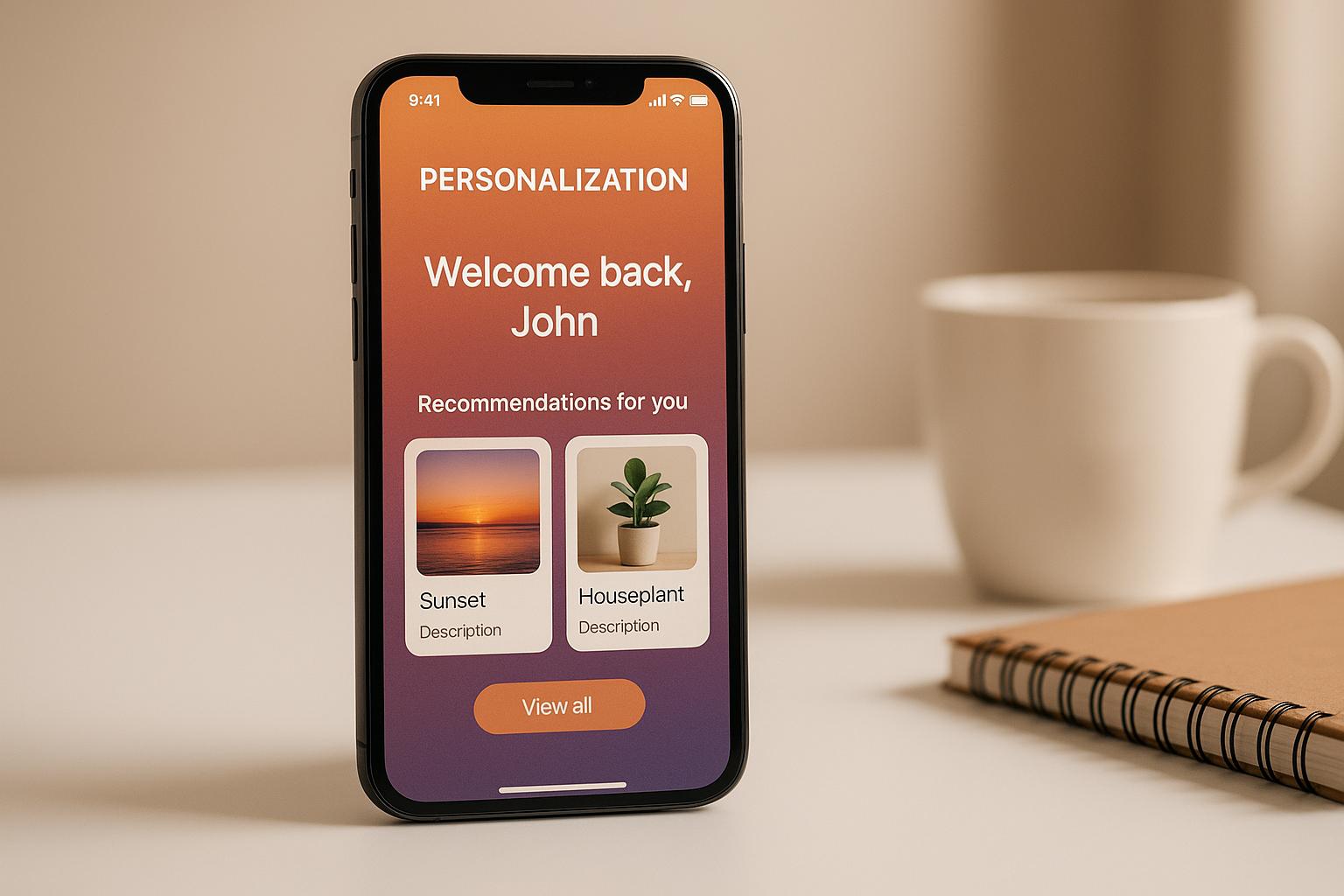By 2025, 71% of consumers expect personalized interactions, and businesses using AI-powered CRMs are seeing 25% average sales growth. With 81% of companies projected to adopt these tools, AI-driven CRMs are becoming essential for creating tailored customer experiences. These platforms analyze data to predict behavior, automate tasks, and deliver personalized communication at scale.
Here are the top 7 AI CRMs in 2025 that stand out for their ability to personalize customer interactions:
- Salesforce Einstein: Advanced AI tools for lead scoring, real-time automation, and predictive analytics. Starting at $25/user/month.
- HubSpot AI CRM: User-friendly with free options and seamless integration. Excels in email personalization and journey automation.
- Zoho CRM with Zia: Affordable and feature-rich, offering sentiment analysis and predictive insights. Starting at $14/user/month.
- Microsoft Dynamics 365 AI: Enterprise-level CRM with powerful analytics and workflow integration. Starting at $65/user/month.
- SuperAGI CRM: Custom AI agents for real-time customer engagement and automation. Pricing on request.
- Freshsales with Freddy AI: Smart deal scoring and predictive insights for sales teams. Starting at $15/user/month.
- Pipedrive AI: Focused on pipeline management with automation and tailored engagement tools. Starting at $14.90/user/month.
AI-powered CRMs improve customer retention by 16%, conversions by 17%, and operational efficiency by 30-50%. Choosing the right one depends on your business size, budget, and integration needs.
Quick Comparison:
| CRM Platform | Predictive Analytics | Automation Features | Starting Price |
|---|---|---|---|
| Salesforce Einstein | Advanced lead scoring | Workflow automation | $25/user/month |
| HubSpot AI CRM | Lead predictions | Smart workflows | Free (paid plans $20/user/month) |
| Zoho CRM with Zia | Sales forecasting | Custom workflows | $14/user/month |
| Microsoft Dynamics 365 AI | Relationship insights | Power Automate workflows | $65/user/month |
| SuperAGI CRM | Custom AI agents | Autonomous task execution | Custom pricing |
| Freshsales with Freddy AI | Deal insights | Smart automation rules | $15/user/month |
| Pipedrive AI | Deal evaluation | Automated deal progression | $14.90/user/month |
These CRMs are reshaping how businesses connect with customers, offering tools to predict needs, automate processes, and deliver personalized experiences. Whether you're a small business or an enterprise, there's an option tailored to your needs.
The 5 Best AI CRMs in 2025
1. Salesforce Einstein
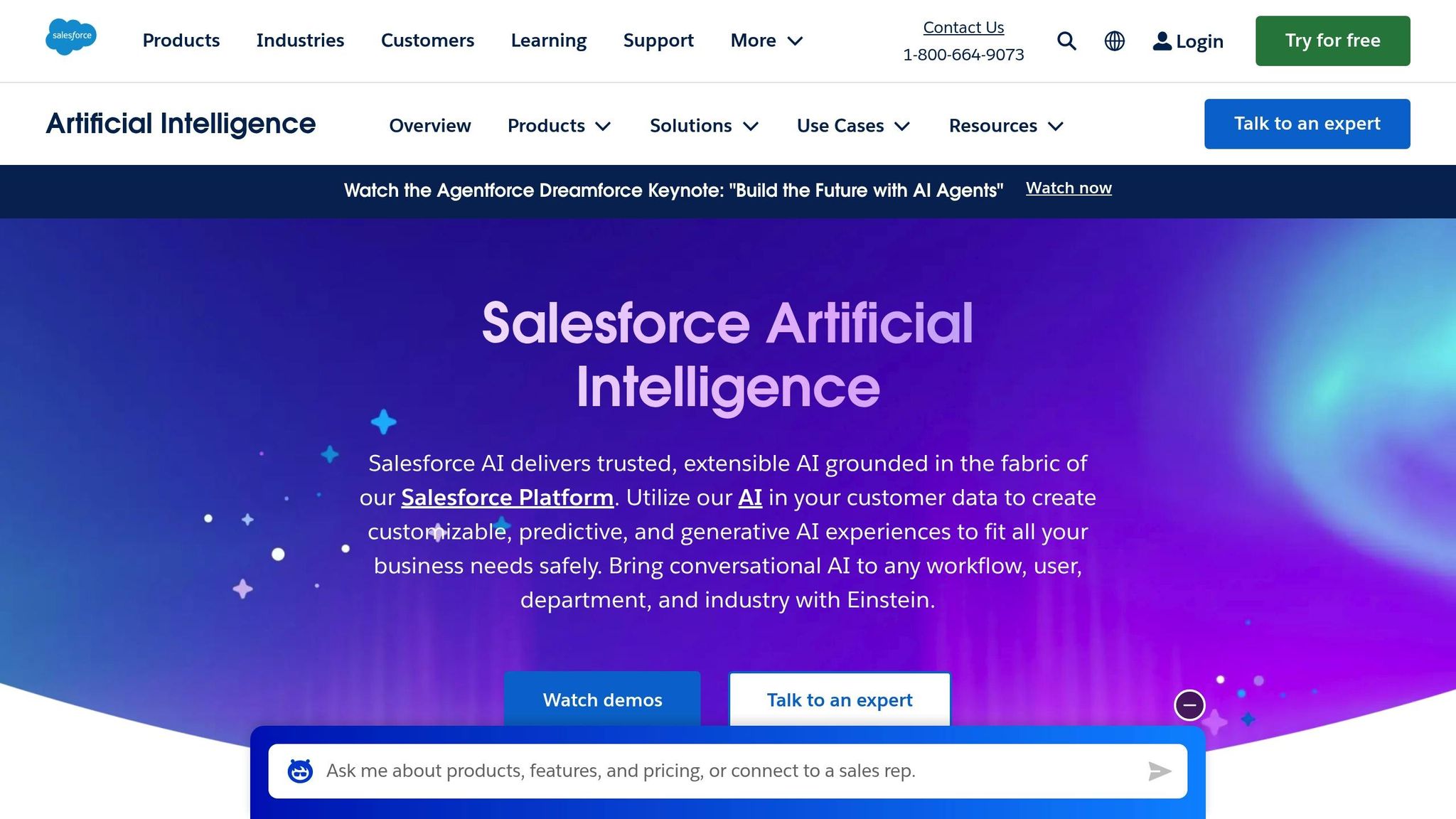
Salesforce Einstein, integrated into the Salesforce ecosystem, uses machine learning and natural language processing to create real-time, tailored customer experiences.
AI-Driven Personalization Features
Einstein takes personalization to the next level, moving beyond simple segmentation. By analyzing vast amounts of data, it delivers highly targeted content across multiple channels like email, SMS, and web-based messaging - customized for each individual customer [7]. This approach has been shown to increase revenue by up to 40% [8].
For instance, Einstein Copy Insights evaluates past campaigns to suggest the best subject lines, tone, and timing for future messages [7]. Meanwhile, Einstein Recommendations fine-tunes product suggestions for each customer, driving higher conversion rates [9]. It also helps design personalized rewards and incentives for loyalty programs, ensuring every interaction feels meaningful and engaging [9].
"Personalization is evolving from general experiences based on demographics to highly individual interactions based on unique search intent, preferences, and context. And generative AI-powered solutions can help brands deliver hyper-personalized experiences at scale, leading to significantly higher engagement and conversions." - Paul Longo, GM of AI Ads at Microsoft Advertising [8]
These capabilities lay the foundation for Einstein's sophisticated journey orchestration tools.
Real-Time Automation and Customer Journey Orchestration
Einstein shines in managing complex customer journeys through its Agentforce 2.0 platform, which integrates AI agents across various business functions. The upgraded Atlas Reasoning Engine enhances decision-making for multi-step processes.
For example, an AI agent can autonomously handle a customer service escalation. It identifies high-priority issues, gathers relevant data from multiple systems, proposes solutions, collaborates with the right teams, and updates the customer - all without human intervention [13]. This level of automation has enabled businesses to close deals 35% faster by leveraging AI for forecasting and opportunity scoring [13].
Predictive Analytics and Actionable Insights
Einstein transforms raw data into actionable insights, enabling businesses to predict sales trends and customer behavior [11]. Tools like Einstein Opportunity Insights track deal activity, email sentiment, communication frequency, and engagement patterns to provide real-time recommendations [7].
The results speak for themselves: 75% of Salesforce customers report increased productivity with Einstein Analytics, saving an average of 11 hours per month per resource in IT, sales, or operations [12]. In Q3 2023, AI influenced 17% of all e-commerce orders on Commerce Cloud, with retailers using Einstein to fine-tune pricing and create tailored offers [10].
Seamless Integration Across Workflows
Einstein works natively across Salesforce's Sales Cloud, Service Cloud, Marketing Cloud, and Commerce Cloud, ensuring smooth and consistent customer experiences without needing third-party tools [7]. This integration allows businesses to maintain personalization at every customer touchpoint.
Service teams using Einstein AI have cut case resolution times by 25% with the help of AI chatbots, automated case routing, and knowledge recommendations [13]. Marketing teams report 40% higher engagement rates thanks to AI-driven content creation and segmented campaigns. Companies adopting AI-powered workflows have also seen an average 20% boost in pipeline growth [13].
Einstein's generative AI features extend to crafting personalized sales emails and customer service responses, reducing manual work while improving content relevance. This not only enhances productivity but also helps businesses lower costs [6].
2. HubSpot AI CRM
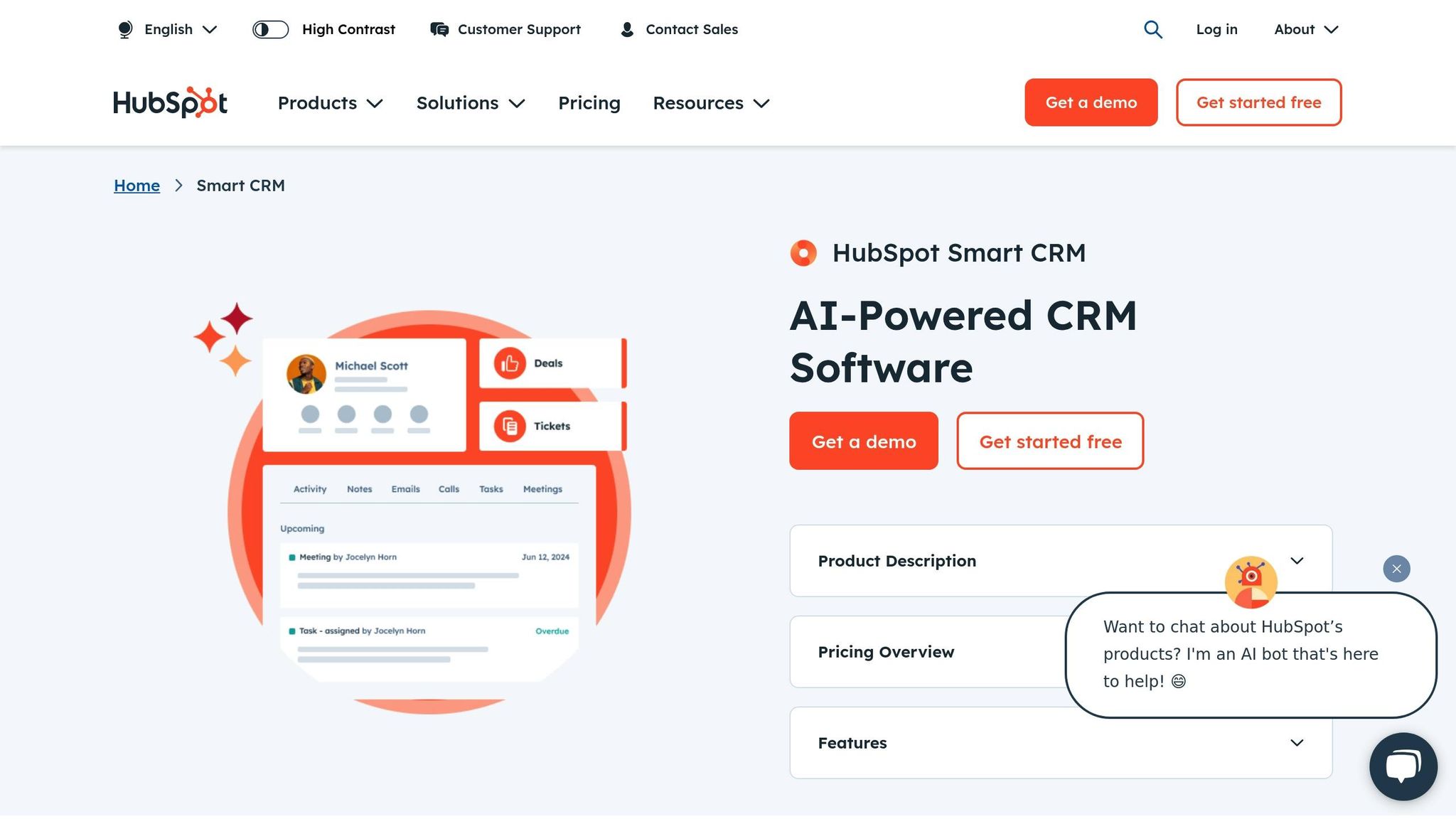
HubSpot AI CRM blends artificial intelligence with an intuitive interface to provide personalized, multichannel customer experiences. With tools like Breeze Copilot and smart content features, it enables businesses of all sizes to harness AI for tailored engagement. This powerful system supports automation and data-driven sales strategies.
AI-Driven Personalization Features
HubSpot's AI tools create smart content that adjusts to individual customer behaviors. By analyzing past interactions and demographic data, it delivers precisely targeted messaging [14]. The AI Email Writer refines subject lines, improves email copy, and suggests optimal sending times based on customer activity [14]. Meanwhile, Breeze Copilot helps craft personalized, multi-touchpoint messages. This approach is backed by data showing personalized emails convert six times more effectively than generic ones [14]. Additionally, the Lookalike Lists feature identifies new potential customers by analyzing existing data patterns [15].
Real-Time Automation and Customer Journey Orchestration
HubSpot's Journey Automation ensures smooth, personalized customer experiences by triggering actions based on user behavior [15]. For instance, dynamic optimization adjusts banners, emails, and messages in response to real-time user activity [16]. These automation tools boost efficiency significantly. For example, the Customer Agent resolves over half of support tickets, reducing the time teams spend closing tickets by nearly 40% [15].
Predictive Analytics and Actionable Insights
HubSpot's predictive analytics turn raw customer data into strategic insights. Its AI-powered tools support sales forecasting and lead scoring, helping teams focus on high-priority opportunities [18]. The platform also predicts deal closures and emerging trends, while sentiment analysis helps identify potential customer churn and new sales prospects [4]. Research reveals that 73% of top-performing sales teams rely on analytics for decision-making [17].
Integration with Sales, Marketing, and Customer Support Workflows
One of HubSpot AI CRM's standout features is its seamless integration across sales, marketing, and customer service. AI tools work cohesively within these departments, ensuring personalized engagement at every stage of the customer journey [17]. Marketing insights enhance sales conversations, while service interactions feed back into future marketing and sales efforts, creating a complete, evolving view of each customer.
"The products we're launching in our Spring 2025 Spotlight are helping teams move fast on AI and solve their go-to-market challenges. We've embedded AI throughout our entire platform so businesses of any size can start seeing value immediately, without massive teams or budgets." – Andy Pitre, EVP of Product at HubSpot [15]
This interconnected system meets a growing demand, with 81% of organizations projected to adopt AI-powered CRM platforms by 2025 [4]. HubSpot AI CRM's capabilities position it as a leader in providing proactive, personalized customer engagement.
3. Zoho CRM with Zia
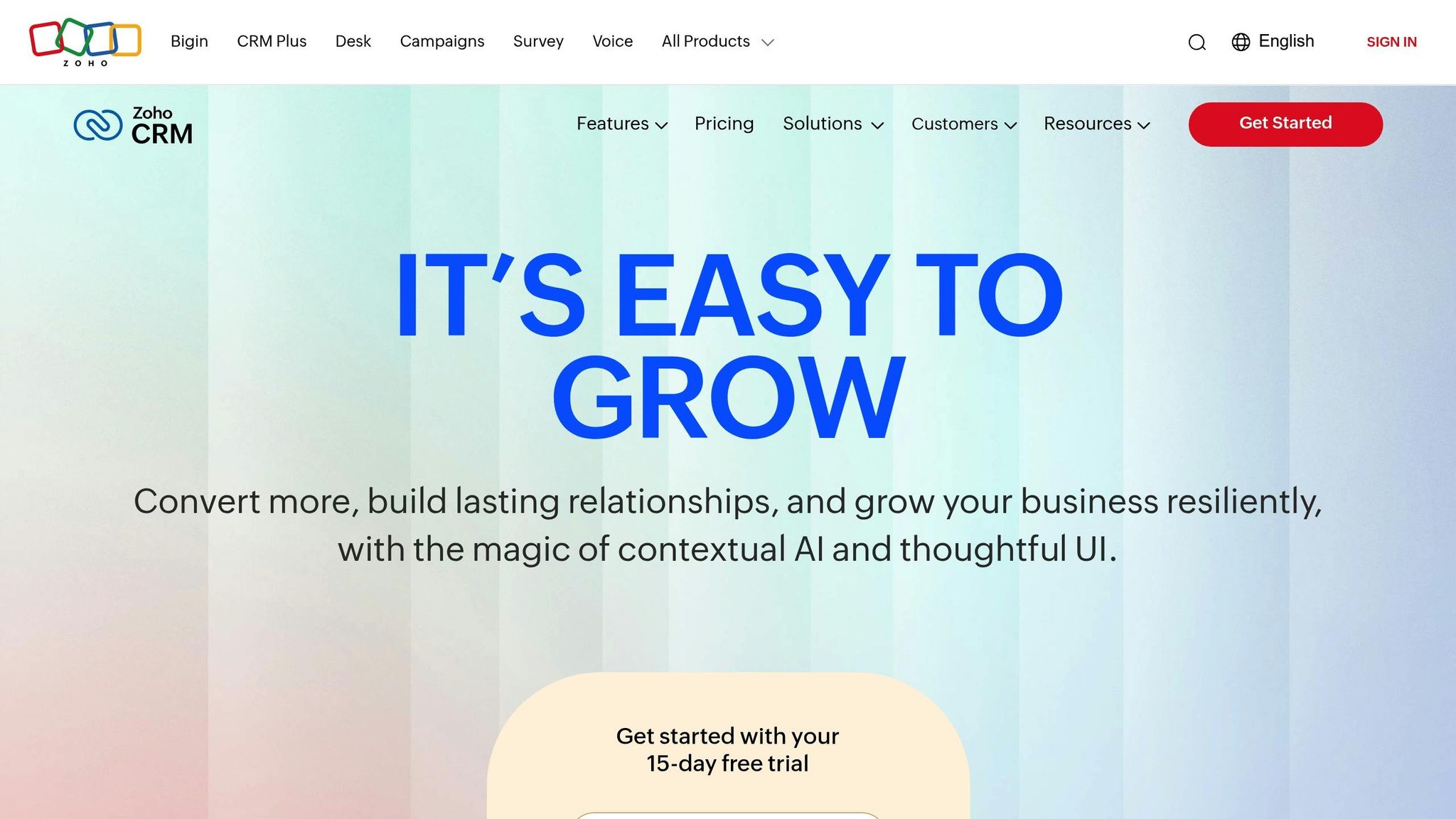
Zoho CRM, powered by its AI assistant Zia, takes AI-driven personalization to the next level. Zia seamlessly integrates intelligent automation into the platform, analyzing customer data to predict outcomes and enabling businesses to design highly tailored sales and marketing strategies. It’s a tool that stands out for providing actionable insights throughout the customer lifecycle.
AI-Driven Personalization Features
Zia uses advanced pattern recognition to create personalized customer engagement strategies. By analyzing customer interactions, it identifies the best times to reach out, offering smart suggestions for the ideal day and time to connect with each individual customer [19]. Its recommendation builder tailors product suggestions based on a customer’s profile and purchase history [32,33]. Zia also uncovers upsell and cross-sell opportunities, helping businesses determine the most relevant products or bundles to offer [19].
Beyond that, Zia evaluates email and call sentiment, intent, and emotional tone, enabling teams to respond thoughtfully to customer communications [32,33]. The assistant’s competitor alerts notify sales teams when competitors are mentioned in prospect emails, while its data enrichment feature ensures customer profiles are always up-to-date, keeping personalization efforts accurate and effective [32,33].
Real-Time Automation and Customer Journey Orchestration
Zoho's CommandCenter, paired with tools like PathFinder and Journey Builder, delivers personalized experiences by tracking individual customer preferences [22]. Features like Connected Records and Connected Workflows ensure smooth coordination across teams, maintaining context throughout the customer journey [23].
"CommandCenter is the ultimate solution to provide your customers with highly personalized brand experiences. Know where each customer is in their journey and ensure every interaction is meaningful to them." [22]
In 2025, Byson Real Estate Co. adopted Zoho CommandCenter for their entire sales process, covering leads, deals, inventory, delivery, and returns. Co-founder Nick Valletta praised the system for offering unparalleled visibility into their sales pipeline and simplifying reporting, which made monitoring stage durations much easier [22].
Zia also empowers workflow automation with real-time insights. Teams can create custom workflows and reports using simple prompts, making the system accessible to a broad range of users. The "CRM for Everyone" initiative further enhances collaboration by centralizing communications and improving visibility across departments [36,37].
Predictive Analytics and Actionable Insights
Zia’s predictive analytics provide a competitive edge by forecasting outcomes, tracking sales trends, and offering win/loss insights [24]. Sales representatives can optimize their daily activities, while managers gain access to strategic, data-driven insights. Zia even evaluates its own prediction accuracy, with scores above 50% considered excellent, and provides visual indicators of trends over time [24]. These tools enable teams to craft effective, personalized sales strategies.
Zia Insights uses advanced analytics and machine learning to deliver detailed descriptive, predictive, and diagnostic insights [25]. For example, in Q1 2025, Zoho introduced Zia Agents, including an SDR agent for lead nurturing and a sales coach agent that provides actionable feedback based on interaction analysis [21].
"The Ask Zia and Zia Insights features are also cool. I can ask for a specific agent name for their quarterly or monthly performance and get to see if their sales numbers are trending up or down, and from which geographic area their sales are coming from. I can also dive into why they can't close deals in other areas and try to replicate the successful ones. From Zia insights, I get which agent is doing the most amount of business and who is doing the least, and I can give their manager an update along with actionable insights - like which specific salesperson has a better understanding of customers on the coast rather than the mountains. These insights give a clear picture of the performance of all our sales reps, and we had this discovery within minutes because of Zia Insights." – John Sheldon, Business Intelligence Manager, Renu Energy Solutions [26]
Integration with Sales, Marketing, and Customer Support Workflows
Zia delivers AI-driven solutions across multiple areas, including Data Management, Productivity, Customer Experience, Analytics, Intelligent Alerts, and Customer Retention [20]. Its Voice of the Customer feature identifies customer needs through centralized insights, while churn prediction tools allow businesses to act before losing customers [32,33]. Zia’s AI scoring helps prioritize high-quality leads, and the strategy influencer offers insights into organizational trends and business targets [32,33].
With team user licenses starting at $9 per user per month on all paid editions, Zoho CRM makes these advanced AI capabilities accessible for businesses of all sizes [23].
"As we democratize CRM with the launch of CRM for Everyone, we also need to build in capabilities that make it easy for anyone to build and extend CRM with simple prompts, without having to be an expert in the system. This is where Zia's advanced capabilities come in." – Mani Vembu, CEO, Zoho [23]
4. Microsoft Dynamics 365 AI
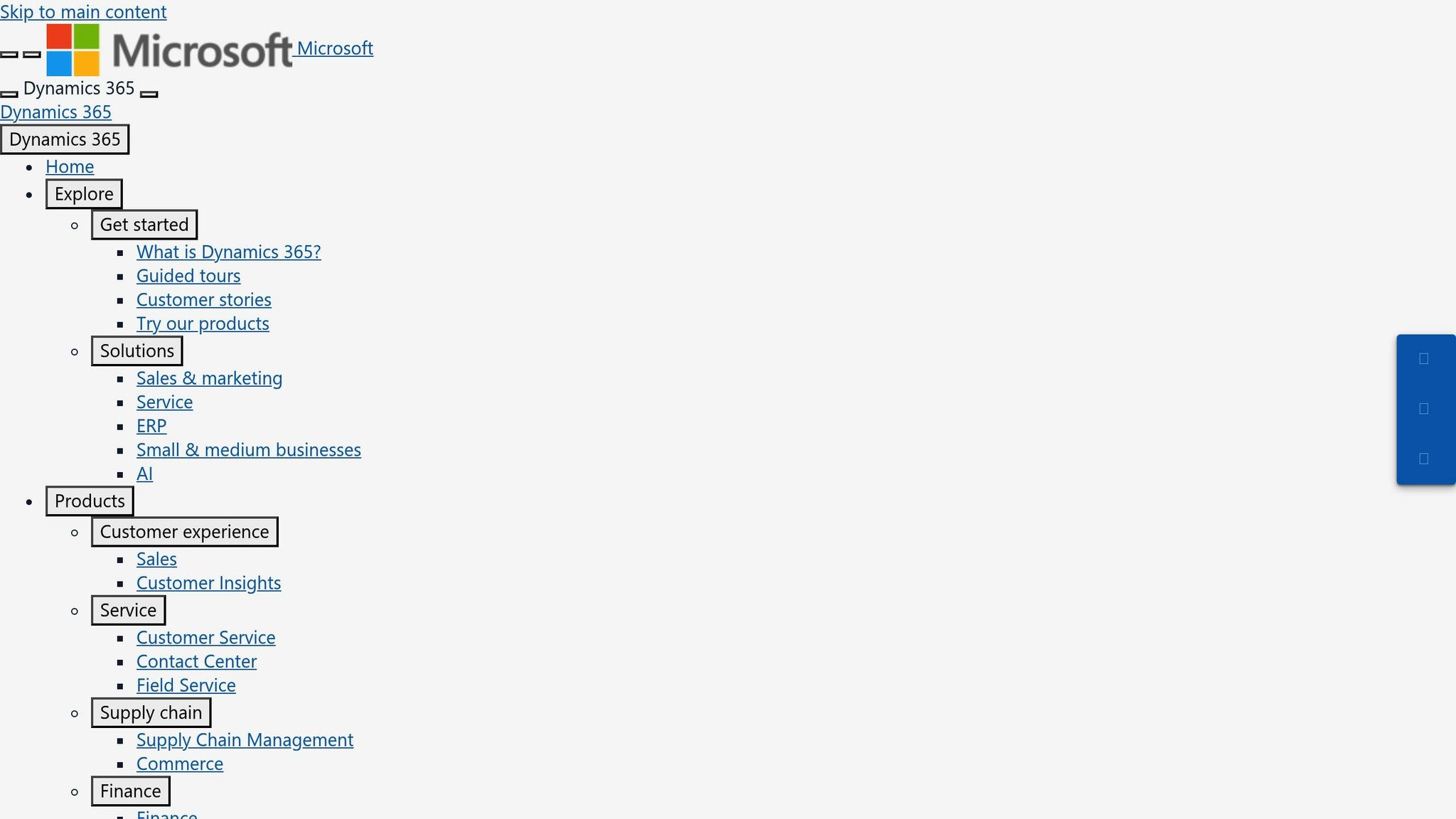
Microsoft Dynamics 365 AI is reshaping customer relationship management (CRM) by combining advanced AI capabilities with a unified system design. It enables businesses to make real-time decisions and deliver highly tailored customer interactions. This seamless integration helps organizations anticipate and meet customer needs with precision.
AI-Driven Personalization Features
Dynamics 365 AI stands out in creating customized customer experiences through intelligent data analysis and automated decision-making. By using AI, the platform uncovers detailed customer insights, builds targeted segments, and crafts personalized email campaigns and customer journeys - all with simple natural language prompts [27]. AI-powered agents can also interact with customers in natural language, providing immediate solutions and seamlessly escalating to human agents when necessary [28].
A great example of this is Apollo Travel, which uses proactive engagement to reduce the number of inbound reservation calls. By deploying custom-built AI agents, they reach out to customers with tailored recommendations, enhancing the travel experience while opening doors to upsell additional services [29].
"We're always looking for ways to better serve our customers, and these new capabilities open up exciting opportunities to engage with them more proactively. We see clear potential for benefits on both sides - improving the experience for our customers while driving efficiency for our business." – Johnny Nilsson, Head of Group Power Platform Center of Excellence at Apollo Travel (part of DERTOUR Group) [28]
This focus on personalization is further strengthened by Dynamics 365 AI's ability to automate processes in real time.
Real-Time Automation and Customer Journey Orchestration
Dynamics 365 Marketing offers real-time customer journey orchestration, enabling businesses to move beyond traditional segment-based campaigns to deliver interactions based on moments that matter [32]. The system reacts instantly to customer actions, determining the next best step for engagement automatically [30][31]. Companies leveraging this approach have reported revenue increases of 10–20%, cost savings of 15–25%, and boosts in customer advocacy scores by 20–40 points [31].
The experience of Campari Group highlights the platform's efficiency. After connecting all data points within Dynamics 365 Customer Insights, they launched their first email marketing automation campaign in the U.S. within weeks, followed by rollouts in the U.K. and Australia [32].
Predictive Analytics and Actionable Insights
Microsoft Dynamics 365 AI uses predictive analytics to identify trends and enable proactive business decisions [34]. By analyzing customer behavior in real time, the platform detects patterns and preferences, allowing businesses to deliver offers that resonate with individual customers [33]. These AI-driven insights help companies anticipate demand, manage inventory more effectively, and reduce costs by recommending clear next steps [34].
A 2024 Forrester Consulting study revealed that AI-powered customer profiling through Dynamics 365 Customer Insights can boost revenue per customer journey by up to 15% [33]. Additionally, businesses using these insights have seen up to a 40% increase in marketing ROI, with 86% reporting higher customer engagement and productivity [35].
Integration with Sales, Marketing, and Customer Support Workflows
Dynamics 365 AI also enhances collaboration across departments by unifying workflows. It ensures that sales, marketing, and customer support teams have access to real-time, accurate customer insights. AI agents compile detailed customer profiles instantly, enabling teams to engage with customers more effectively [33]. The platform simplifies complex data into actionable insights, supporting personalized strategies across all departments. This shared access fosters consistent, meaningful customer interactions.
This unified approach doesn't just improve efficiency - it makes work more fulfilling. Surveys show that 89% of employees feel more engaged when they can focus on meaningful tasks [27]. Additionally, 82% of business leaders plan to expand their use of digital labor within the next 12 to 18 months, aligning perfectly with the capabilities offered by Dynamics 365 AI [28].
sbb-itb-9cd970b
5. SuperAGI CRM
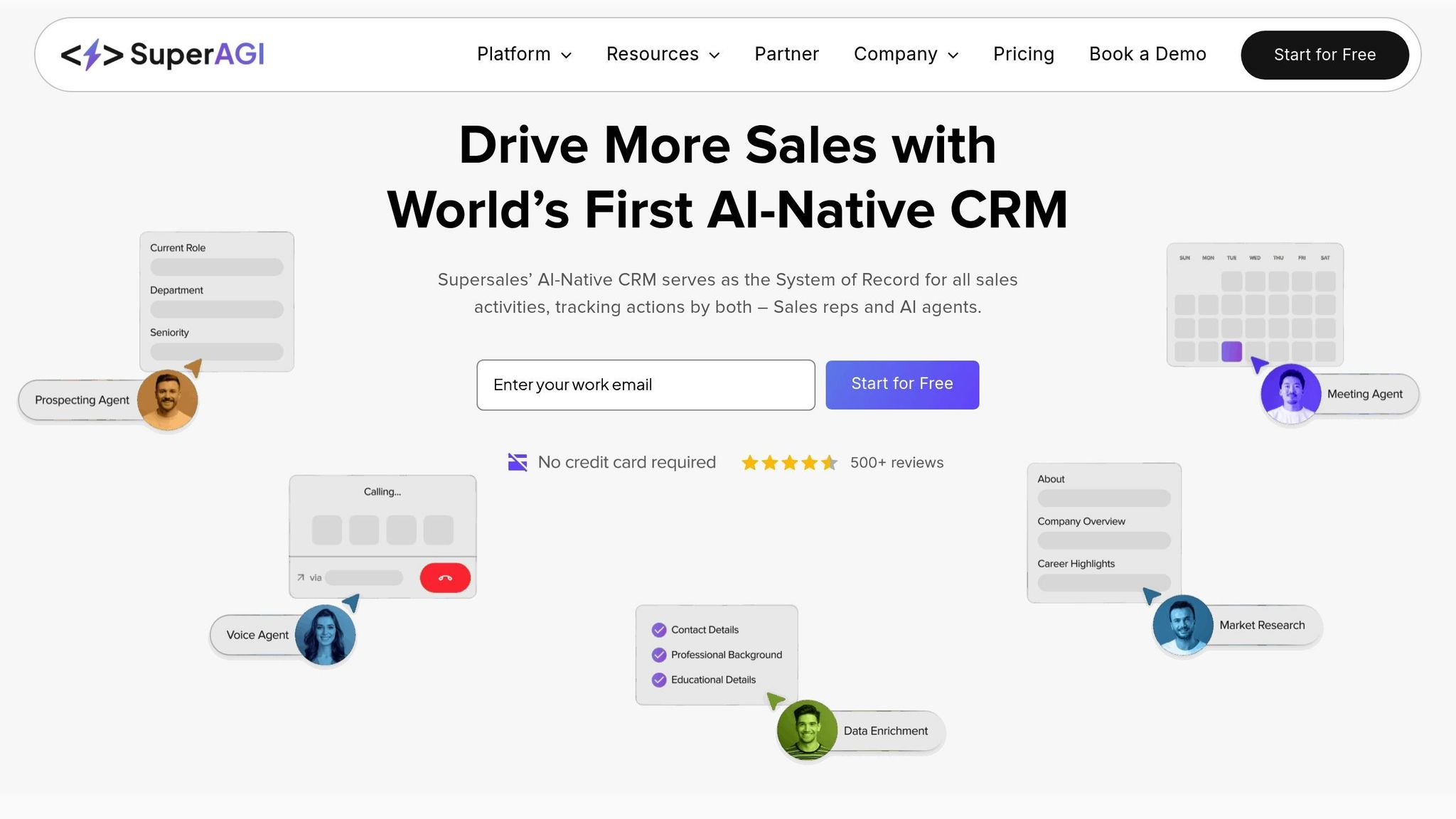
SuperAGI CRM brings AI into the world of customer relationship management, offering tools to deliver highly personalized experiences on a large scale. By combining advanced machine learning with real-time automation, this platform creates customer journeys that adapt instantly to individual behaviors and preferences. Let’s dive into how SuperAGI CRM excels in personalization, automation, analytics, and integration.
AI-Driven Personalization Features
SuperAGI CRM takes personalization to the next level by using machine learning to analyze customer interactions in real time. This allows the platform to deliver dynamic content, tailored communication, and adaptive lead scoring - going far beyond basic segmentation.
Every customer interaction - whether through email, chat, or phone - is customized to meet the individual’s specific needs and stage in their journey. The system continuously learns from these interactions, refining its understanding of preferences and adjusting communications accordingly [2].
For example, a mid-sized SaaS company that adopted SuperAGI CRM saw impressive results within six months: email open rates increased by 30%, and lead-to-customer conversions rose by 25%. By leveraging AI-powered personalization and real-time automation, the company delivered relevant content and perfectly timed follow-ups, boosting both customer satisfaction and loyalty [2].
Real-Time Automation and Customer Journey Orchestration
At the heart of SuperAGI CRM’s automation capabilities are signal-based triggers that react instantly to customer actions. These triggers handle tasks like lead nurturing, follow-up reminders, and task assignments automatically, ensuring no opportunity slips through the cracks [37].
The platform’s customer journey orchestration tools take things further by mapping out personalized paths for each prospect through the sales funnel. Outreach and engagement tactics adjust dynamically based on live data, allowing sales and marketing teams to deliver the right message at exactly the right time [36].
Unlike traditional rule-based automation, SuperAGI CRM evolves in real time, crafting multi-step journeys that adapt as customer interactions unfold. This ensures that every customer experience feels uniquely tailored, even though the system operates at scale [37].
Predictive Analytics and Actionable Insights
SuperAGI CRM’s predictive analytics engine uses both historical and real-time data to forecast customer behavior, sales trends, and potential churn risks. It identifies patterns, suggests optimal engagement times, and provides actionable recommendations based on these insights [2].
This means sales and marketing teams can focus on high-value opportunities while proactively addressing potential issues. Instead of overwhelming teams with raw data, the platform translates complex patterns into clear, actionable steps that can be implemented immediately [37].
Integration with Sales, Marketing, and Customer Support Workflows
SuperAGI CRM seamlessly integrates with existing tools across sales, marketing, and customer support, creating a unified flow of data for all customer-facing teams. From email marketing tools to helpdesk software and sales enablement platforms, it ensures everyone has access to the most up-to-date customer information [36].
This unified system fosters collaboration across departments. Sales teams can view recent support interactions, marketing teams can track campaign results, and support agents have access to complete customer histories - all within a single platform [37].
6. Freshsales with Freddy AI
Freshsales blends traditional CRM tools with Freddy AI, a smart assistant designed to elevate how sales teams operate. By integrating features like deal scoring, email automation, and predictive insights, it helps teams close deals more efficiently.
AI-Driven Personalization Features
Freddy AI brings all customer data into a single, unified view, allowing sales teams to tailor their outreach based on individual activity. It can draft prospecting emails by analyzing past interactions, industry trends, and engagement patterns. Additionally, it uses machine learning to score deals, evaluating both historical and current engagement data to prioritize opportunities [39].
Predictive Analytics and Actionable Insights
Freddy AI takes predictive analytics to the next level with tools like revenue forecasting and bottleneck identification. By examining historical data and monitoring the current sales pipeline, it offers actionable recommendations. These include deal-specific insights and risk alerts derived from email analysis and past patterns. With these real-time insights, sales managers can tackle obstacles head-on and speed up the sales process [38]. Plus, Freshsales ensures the entire sales workflow stays in sync for maximum efficiency.
Integration with Sales, Marketing, and Customer Support Workflows
Freddy AI seamlessly fits into existing sales workflows, ensuring smooth communication and data sharing across your tools. Its generative AI simplifies repetitive tasks, keeping everything connected across your tech stack.
Businesses using AI-powered CRMs like Freshsales often report a 15% boost in repeat sales and customer retention [40]. Freshsales offers three pricing tiers to suit different needs: Growth ($18/user/month), Pro ($47/user/month), and Enterprise [39][40].
7. Pipedrive AI
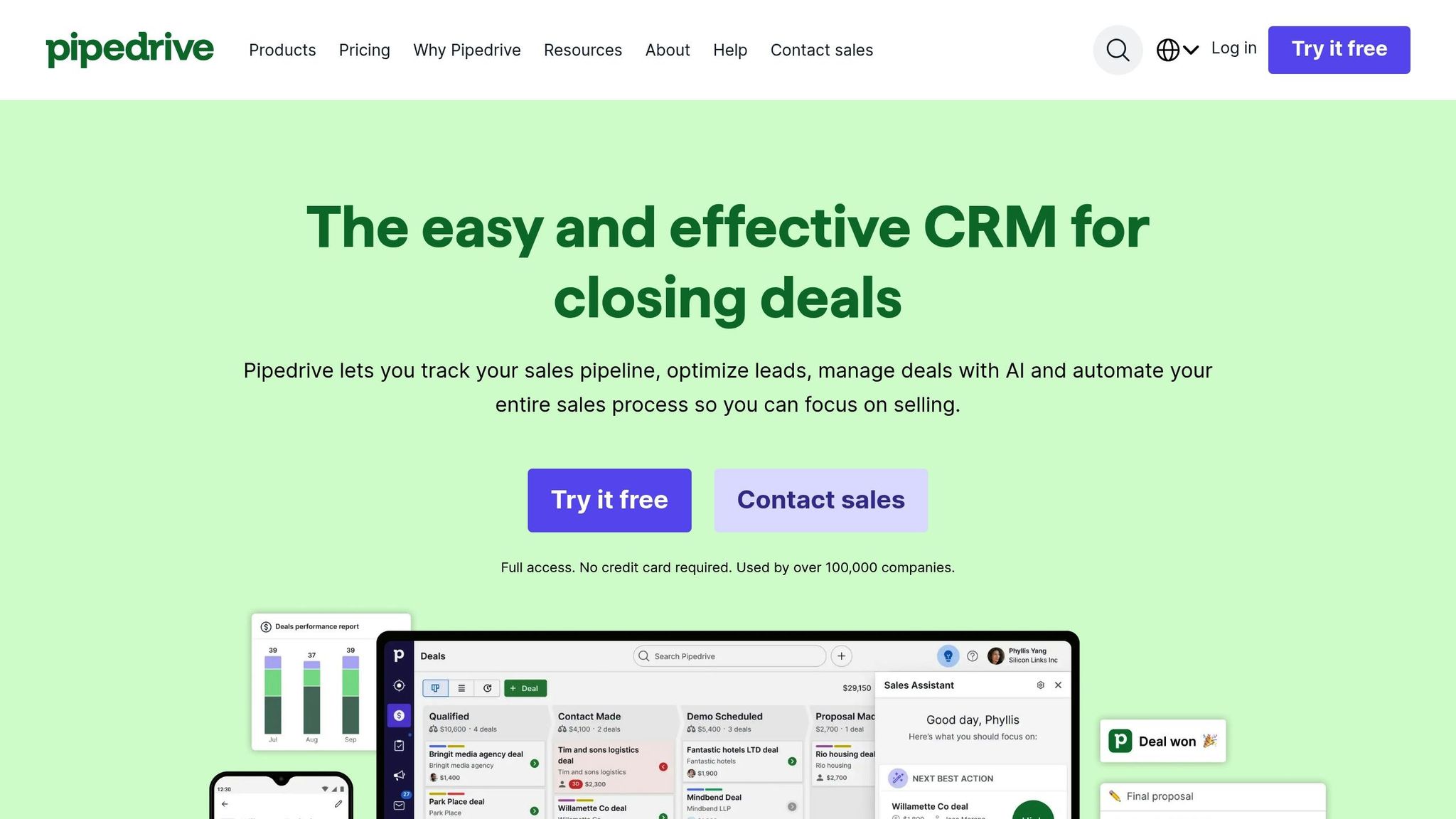
Pipedrive AI takes pipeline management to the next level by blending smart automation with personalized customer engagement. Its AI Sales Assistant analyzes deals, emails, and prospect activities to suggest the next best steps, freeing up sales reps to focus on what matters most: driving revenue.
AI-Driven Personalization Features
Pipedrive's AI tools are all about crafting tailored customer experiences using automation and data insights. For instance, the AI email writer creates customized emails based on simple prompts. It taps into customer data and interaction history, removing the guesswork from outreach. Additionally, the platform offers personalized app recommendations by analyzing your team's workflows, suggesting tools and integrations that align with your sales strategies[41].
Beyond personalization, Pipedrive AI simplifies routine processes, making daily tasks easier for teams.
Real-Time Automation and Customer Journey Orchestration
Sales reps often spend a significant chunk of their time - up to 51% - on repetitive administrative tasks like CRM data entry and lead research[42]. Pipedrive addresses this with its Automations feature, which sets up workflows and triggers for advancing deals, scheduling retention campaigns, and optimizing timing with delay features[43].
Integration with Sales, Marketing, and Customer Support Workflows
Pipedrive AI works seamlessly across sales, marketing, and customer support, ensuring smooth data sharing and consistent processes. It can automatically assign deals to the right reps, standardize workflows to minimize errors, and send personalized emails when deals hit specific stages. Plus, real-time Slack notifications keep teams updated[43].
Research highlights the benefits of automation: professionals who automate tasks are 16% more likely to meet their goals, and sales and marketing teams with access to automation tools report 22% higher job satisfaction[43]. Gabriel Fugli, Head of Channel EMEA Central at Pipedrive, sums it up perfectly:
"Revenue isn't just about more leads – it's about what you do with them."[42]
Pipedrive's AI Sales Assistant is included in the Professional ($49/user/month), Power ($64/user/month), and Enterprise ($99/user/month) plans, billed annually[39]. The platform is also rolling out specialized AI agents for tasks like email management, further streamlining sales workflows[41]. These tools enhance the CRM experience, aligning with the platform's focus on personalization and automation.
Feature Comparison Table
Choosing the right AI-powered CRM can feel overwhelming, especially when many options promise similar benefits. The key is to focus on personalization features that can enhance customer engagement and drive revenue growth.
To help simplify your decision, the table below outlines the core features of leading AI CRMs. These features are critical for predicting customer needs, automating meaningful interactions, and delivering the personalized experiences that 71% of consumers now expect from businesses [2].
| CRM Platform | Predictive Analytics | Real-Time Automation | AI-Powered Chatbots | Sentiment Analysis | Integration Capabilities | Starting Price |
|---|---|---|---|---|---|---|
| Salesforce Einstein | Advanced lead scoring, opportunity insights, pipeline predictions | Workflow automation, trigger-based actions | Native Einstein Bot with NLP | Email and social sentiment tracking | Extensive AppExchange ecosystem | $25/user/month |
| HubSpot AI CRM | Lead and deal predictions, content optimization | Smart workflows, automated sequences | Built-in chatbot builder with AI | Contact and conversation sentiment | Native integrations with Google, Slack, Zoom | Free (paid plans from $20/user/month) |
| Zoho CRM with Zia | Deal and lead predictions, sales forecasting | Custom workflows, automated tasks | Zia chatbot with natural language processing | Email and social media sentiment analysis | Native Zoho suite integration | $14/user/month |
| Microsoft Dynamics 365 AI | Relationship insights, sales playbooks | Power Automate workflows, AI-driven triggers | Power Virtual Agents integration | Customer sentiment from multiple channels | Deep Microsoft 365 integration | $65/user/month |
| SuperAGI CRM | Custom AI agents for predictions | Autonomous task execution | AI agents for customer interactions | Multi-channel sentiment monitoring | API-rich architecture | Custom pricing |
| Freshsales with Freddy AI | Predictive contact scoring, deal insights | Smart automation rules, task suggestions | Freshchat AI bot integration | Email and phone sentiment analysis | Calendar, email marketing, DocuSign integrations | $15/user/month |
| Pipedrive AI | Deal evaluation, prospect activity analysis | Automated deal progression, retention campaigns | Third-party chatbot integrations | Basic email sentiment tracking | Slack notifications, workflow integrations | $14.90/user/month |
From the table, Salesforce Einstein and Microsoft Dynamics 365 AI emerge as leaders in predictive analytics, a feature that has been shown to boost customer retention rates by an average of 25% [4]. These platforms provide advanced insights into customer behavior, helping businesses anticipate needs more effectively.
For smaller businesses, HubSpot AI CRM stands out with its robust free tier and built-in chatbot capabilities. Its focus on inbound marketing automation aligns with research showing that personalized email subject lines increase open rates by 26% [5]. Meanwhile, Zoho CRM with Zia delivers a well-rounded feature set at a budget-friendly price, excelling in sentiment analysis - a tool 62% of companies credit for improving customer service through personalization [1].
Integration capabilities are another major factor to consider. Salesforce's AppExchange offers a vast marketplace of third-party apps, while Microsoft Dynamics 365 AI seamlessly connects with Office 365 tools, streamlining workflows for teams already using Microsoft's ecosystem. HubSpot's native integrations with tools like Google and Slack make it easy to set up without requiring advanced technical skills.
When it comes to automation, platforms like Salesforce and Microsoft Dynamics 365 AI offer sophisticated workflows triggered by specific actions, while newer solutions like SuperAGI CRM leverage autonomous AI agents to handle complex tasks independently.
Pricing varies widely. High-end solutions like Microsoft Dynamics 365 AI cater to enterprise needs, while affordable options like Zoho CRM and Pipedrive AI are tailored for small to medium-sized businesses. Research suggests that using AI-powered CRMs can increase revenue by up to 25% [4].
Before committing to a platform, consider your team's existing tools and technical expertise. Native integrations are typically easier to implement than custom solutions, and the learning curve can differ significantly between systems. Free trials are a great way to explore how each CRM's personalization features align with your customer data and workflows. Use the table above as a reference to match each platform's strengths to your business needs.
Conclusion
AI-driven personalization is proving to be a game-changer for businesses, boosting customer retention by 16%, increasing conversions by 17%, and improving sales force efficiency by 21% [5]. These numbers aren't just impressive - they highlight how personalization can provide businesses with a powerful edge in competitive markets.
The demand for personalized experiences is undeniable. A staggering 71% of consumers now expect tailored interactions, and 76% admit to feeling frustrated when businesses fail to deliver [5]. The financial impact is just as striking: personalization can generate five to eight times the ROI on marketing spend and increase sales by at least 10% [44].
Real-world examples bring these statistics to life. Walmart's personalization initiatives resulted in a 20% sales increase [45], while Stitch Fix achieved an incredible 88% customer retention rate [44]. These success stories illustrate how tailoring interactions can directly impact a company's bottom line.
"AI is revolutionizing the way businesses manage customer relationships. By leveraging AI-powered CRMs, businesses can transform their CRM systems into powerful engines of growth, delivering superior customer experiences and achieving a competitive advantage." - Nikolaus Kimla, CEO of Pipeliner CRM [46]
The evidence is clear: choosing the right AI-powered CRM is crucial for growth. Platforms like Salesforce Einstein and HubSpot AI CRM offer tools to build stronger customer connections and deliver measurable results. For startups, cost-effective solutions like Zoho CRM provide a great starting point, while enterprises may benefit from the advanced capabilities of Microsoft Dynamics 365 AI. The key lies in aligning your business needs with the right features.
As we approach 2025, the companies that succeed will be those that embrace AI not just to streamline processes, but to predict customer needs and create experiences that feel genuinely personal. With 88% of marketers already incorporating AI into their daily work [1] and the AI in CRM market projected to hit $48.4 billion by 2033 [3], the real question is no longer if you should adopt AI-powered CRM, but which platform will best serve your customers and fuel your growth.
Investing in AI-driven personalization today isn't just about improving current operations - it's about securing your place in tomorrow's marketplace. By turning transactions into meaningful relationships, these tools can redefine how businesses connect with their customers and ensure long-term success.
FAQs
How can AI-powered CRMs boost customer retention and increase sales?
AI-powered CRMs are transforming how businesses maintain customer loyalty and boost sales. By using advanced data analysis and automation, these systems dig into customer behavior and preferences to craft personalized experiences that encourage deeper connections and engagement.
On the sales side, they bring predictive analytics and automated workflows into play, helping teams focus on the most promising leads, predict what customers might need next, and close deals more efficiently. With streamlined communication and customized solutions, AI-powered CRMs not only drive revenue growth but also help businesses nurture long-term customer relationships.
What should businesses look for in an AI CRM platform to enhance personalization?
When choosing an AI-powered CRM platform for personalization in 2025, businesses should look for features that enable customized, real-time interactions. Tools like predictive analytics, natural language processing (NLP), and customer journey mapping are key to delivering engaging and dynamic customer experiences.
It's also important to pick a platform that supports omnichannel engagement, ensuring smooth communication across various channels. As businesses grow, scalability becomes crucial, and strong data privacy protections are a must to safeguard customer information and meet regulatory requirements. Focusing on these elements can help businesses strengthen customer connections and enhance engagement effectively.
How do AI CRMs like Salesforce Einstein and HubSpot AI seamlessly fit into existing business workflows?
AI-powered CRMs like Salesforce Einstein and HubSpot AI CRM are designed to integrate effortlessly into business workflows. They take over repetitive tasks and keep data synchronized across different platforms, making day-to-day operations smoother.
Salesforce Einstein stands out with features like smart lead scoring, opportunity insights, and predictive analytics. These tools help sales teams zero in on high-priority tasks, boosting efficiency. On the other hand, HubSpot AI CRM uses AI-driven lead scoring and tailored sales strategies to make customer interactions more effective.
Both platforms excel at sharing data seamlessly with other systems. This reduces manual work, ensures workflows stay consistent, and helps businesses save time while improving accuracy and productivity.

